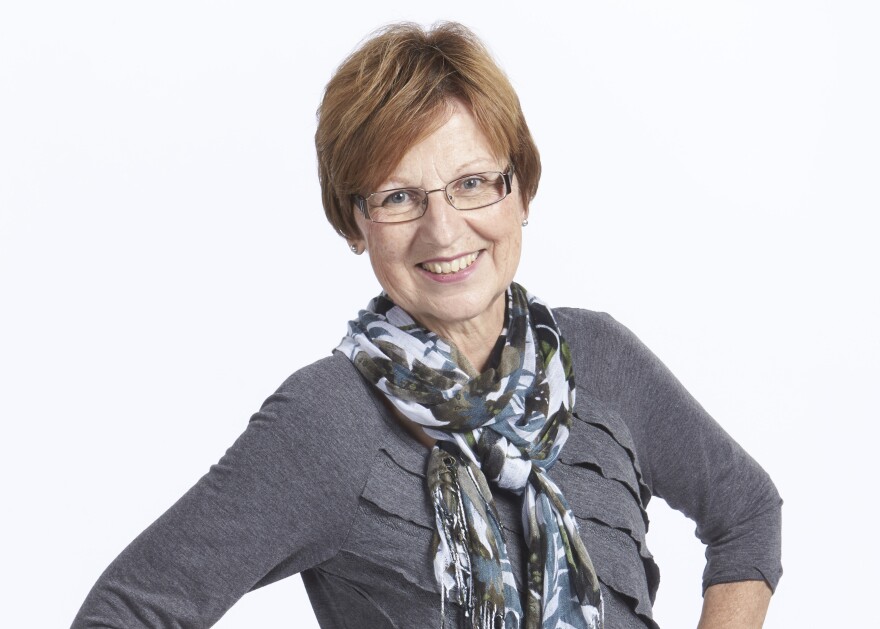State officials estimate that 110,000 adults in Wisconsin live with dementia or one of its forms — Alzheimer's disease.
Nationally, one in three adults knows a spouse, family member or other blood relative with Alzheimer's. Congress and President Donald Trump recently OK'd spending $100 million over the next five years to combat the problem.
A Brookfield man, Harlan Mueller, knows the issue all too well. His spouse, Gail, died of Alzheimer's.
Harlan & Gail Mueller
The Mueller's story begins about eight years ago. They were married for about 45 years, when in their mid-60's, their daughter started noticing something unusual about Gail Mueller.
"It was the repetitiveness that my daughter noted. Gail kept repeating a lot of things, or asking the same question," Harlan Mueller recently told WUWM.
At first, he thought nothing was wrong. "I said, 'Aw, she's no different than I am. We get older, we start losing our memory,' " he said.
But eventually, the daughter convinced him to take his wife to a medical facility to be tested.
READ: Dementia's Impact On A Milwaukee Man's Life
In 2012, Gail Mueller was diagnosed with early stage Alzheimer's. That's a condition that can include problems coming up with the right word or name, remembering newly-learned names or material, losing or misplacing a valuable object, and troubles with planning, organizing or performing tasks.
Harlan Mueller says occasionally when they met with other people, her symptoms weren't obvious.
"Many friends would see her and say, 'She doesn't have a problem.' Many times, they can react different in front of other people. So, that became a real issue in time. That nobody really knew what you were experiencing," he said.
READ: Wisconsin Researchers Look For Ways To Prevent Dementia
He says to begin with, there wasn't much help from the medical community. “The place where she was diagnosed, we were told, 'Take this medication and come back in a year.’ We were just devastated," he said.
Meanwhile, his disease led to changes in his duties at their Brookfield home. "You know, as a couple, we shared everything. So, all of a sudden, the burden upon me became quite heavy, to the point where it was starting to impact me," he explained.
"You know, as a couple, we shared everything. So, all of a sudden, the burden upon me became quite heavy, to the point where it was starting to impact me," says Harlan Mueller.
But Harlan Mueller found a support group through the Alzheimer's Association — a group for caregivers. "And I was going to it, and she said, 'Why can't I go to it?' I said, 'It's only for caregivers.' She said, 'Wait a minute, I'm the one with the disease. What about me?' " he said.
"Those words drive me today —'What about me?' because there is still so much that needs to be done to educate society, the medical profession, communities, first responders," he said.
Gail Mueller eventually met others who were afflicted and bonded with them. But as she struggled with Alzheimer’s, she eventually was relocated to a home for seniors.
She died in 2017, at age 72, with the cause of death officially listed as Alzheimer's. That’s a relative rarity.
Getting Help
Randy Kohl, dementia care specialist for Waukesha County, says every family's story is a bit different. But he recognizes a lot of what the Muellers went through. He says the BOLD (Building Our Largest Dementia Infrastructure For Alzheimer's) Act, the $100 million plan passed in December by Congress, is likely to help families.
Kohl says one component is additional training and help for caregivers, “Because we have so many individuals in that caregiving role, but they've never been trained. It's not like there's a book or manual somebody gets and says this is how you now become a caregiver," Kohl said.
READ: Research & Resources Are Needed For Latinos & African-Americans Suffering From Alzheimer's
He says he believes there will also be funds to help train first responders who encounter dementia patients. But he cautions that Congress still has to figure out how to divide all the money, some of which will go to federal and state partnerships to promote brain health, and better data collection on Alzheimer's.
In the meantime, Kohl is helping carry out a state of Wisconsin plan to make more communities "dementia friendly."

Kohl spoke last week to a small group at Elmbrook Hospital. Elmbrook — short for Elm Grove and Brookfield — may join a few other Waukesha County communities that have pledged to accept, understand, support and engage persons with dementia, their families and caregivers.
Brookfield Mayor Steven Ponto says he attended the meeting because some people never want to move out of his community. "You know, we want people to live happily in Brookfield as long as they want to be here," Ponto told WUWM.
He says churches, senior homes and the city's senior center are among the institutions likely to band together. It's a safety net that other, less well-to-do communities may have a tough time matching.
On Wednesday, at the Capitol in Madison, a meeting will be held on policies and strategies for a dementia-friendly state.
Do you have a question about innovation in Wisconsin that you'd like WUWM's Chuck Quirmbach to explore? Submit it below.
_


